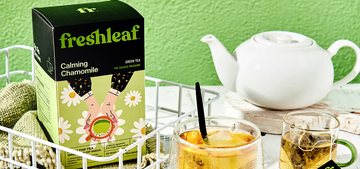Feeling Like a Balloon? Let’s Fix That Bloating with Tea!
We’ve all been there, you enjoy a hearty meal, and the next thing you know, your stomach is staging a protest. Bloating can make you feel heavy, sluggish, and just plain uncomfortable. But before you reach for those over the counter remedies, there’s a gentler (and tastier) solution sitting right in your kitchen: tea.
Tea has been used for centuries as a natural digestive aid, packed with antioxidants, anti-inflammatory properties, and gut-friendly compounds, the right tea can help ease bloating, improve digestion, and get your stomach back to feeling normal. So, let’s talk about why tea could be the remedy you’ve been looking for all this time, we’ll talk about which tea works best, and how to brew them for maximum relief.
Why Tea for better digestion? The Science Behind Tea for Digestion & Bloating
You might be wondering, why tea? Why not just take a quick antacid? Well let’s discuss why:
1. Tea has Natural Anti-Bloating Properties
Many herbal teas contain carminative properties, meaning they help reduce gas buildup in the stomach and intestines. Carminative compounds work by relaxing the gastrointestinal tract, which prevents excess gas from being trapped and causing discomfort.
2. Some Teas Support Gut Health
Some teas help promote peristalsis, the wave-like muscle contractions in your digestive tract that move food along. Slow gut motility can lead to bloating and discomfort, but certain teas can help stimulate digestion and prevent stagnation.
3. Tea Reduces Inflammation
Inflammation in the gut can lead to bloating, cramping, and discomfort. Herbal teas contain flavonoids and polyphenols that have anti-inflammatory effects, helping to calm the digestive system and reduce irritation in the gut lining.
4. Tea Aids in Water Balance
Excess water retention can also cause bloating. Some teas act as natural diuretics, helping your body flush out excess water and sodium, which reduces puffiness and bloating.
5. Tea Balances Gut Microbiome
Certain teas have prebiotic properties, meaning they support healthy gut bacteria. A well-balanced gut microbiome can improve digestion and reduce bloating caused by gut imbalances.
Best Teas for Bloating (And Why They Work!)
1. Peppermint Tea
Why it works: Peppermint tea contains menthol, which acts as a natural muscle relaxant. It soothes the digestive tract, reducing spasms that cause bloating and discomfort. It also helps relieve gas and improve overall digestion.
Scientific Backing: Studies suggest that peppermint oil can help with irritable bowel syndrome (IBS) symptoms, including bloating and cramping, making peppermint tea a great natural remedy.
How to prepare:
-
Steep 1-2 teaspoons of dried peppermint leaves in hot water for 5-7 minutes.
-
Drink warm after meals for best results.
Now, the preparation sounds a little hard. Right? I mean where are you gonna find peppermint leaves? Don’t worry, I’ve got the solution, here, try Freshleaf’s Moroccan Mint tea, crafted with the goodness of peppermint and spearmint, this tea is sure to do the trick.
Best for: Gas, bloating, indigestion, and stomach cramps.
2. Ginger Tea
Why it works: Ginger contains gingerol and shogaol, compounds that speed up stomach emptying and reduce bloating. Ginger also has strong anti-inflammatory and anti-nausea properties.
Scientific Backing: Research shows that ginger can increase the movement of food through the stomach, reducing the chances of bloating and indigestion.
How to prepare:
-
Slice fresh ginger (about 1-inch piece) and steep it in boiling water for 10 minutes.
-
Add a squeeze of lemon and honey for added benefits.
Ahh, cutting ginger? There’s a risk, there’s a risk of getting tired, right? Well, why don’t you just hover over the website and check out Freshleaf’s Herbal Turmeric Ginger tea? I’m sure it’ll do the trick!
Best for: Post-meal bloating, nausea, and sluggish digestion.
3. Fennel Tea
Why it works: Fennel contains anethole, a compound known for its anti-spasmodic properties. It helps relax the intestinal muscles, allowing trapped gas to pass and reducing bloating.
Scientific Backing: Studies indicate that fennel has carminative and anti-inflammatory effects, making it excellent for digestive discomfort.
How to prepare:
-
Crush 1 teaspoon of fennel seeds and steep in hot water for 5-7 minutes.
-
Drink before or after meals for best results.
Fennel, even though a very common ingredient everyone is rarely known for its benefits and even more rarely used for the same! But don’t worry, we didn’t forget fennel, that’s why we’ve used it in our teas! So, try, Freshleaf’s Chai teas today!
Best for: Gas, bloating, and IBS-related discomfort.
4. Chamomile Tea –
Why it works: Chamomile contains apigenin, a natural compound with anti-spasmodic and anti-inflammatory properties. It soothes digestive distress and relaxes the gut muscles.
Scientific Backing: Chamomile has been traditionally used for digestive disorders, and research supports its role in reducing bloating and cramping.
How to prepare:
-
Steep 1 chamomile tea bag (or dried chamomile flowers) in hot water for 5 minutes.
-
Drink before bed to relax the gut and improve digestion overnight.
The best tea for good sleep is also one of the best tea for fighting bloating and easing digestion! Buy today from the store, visit our website, and try Freshleaf’s Chamomile Green Tea
Best for: Stress-related bloating, gas, and indigestion.
5. Green Tea –
Why it works: Green tea is loaded with catechins, which enhance digestion and reduce gas buildup. It also has mild diuretic properties that help with water retention.
Scientific Backing: Studies have shown that green tea can aid digestion and help prevent bloating by supporting gut-friendly bacteria.
How to prepare:
-
Steep a green tea bag in hot water for 2-3 minutes.
-
Drink in the morning to support digestion throughout the day.
“Well, generally any green tea can do the trick”, this is what an amateur would say, however, we’re saying no, only drink quality tea, try Freshleaf’s Green tea
Best for: Bloating from overeating, sluggish metabolism, and water retention.
6. Lemon Tea –
Why it works: Lemon aids digestion by stimulating bile production, which helps break down fats. It also has mild anti-spasmodic effects that relax the digestive tract.
Scientific Backing: Research supports lemon balm’s role in reducing bloating, especially for those with functional dyspepsia.
How to prepare:
-
Steep fresh or dried lemon balm leaves in hot water for 5 minutes.
-
Drink warm after heavy meals.
Do I still even need to say something? Go now! Try Freshleaf’s Lemon Honey Delight!
Best for: Stress-induced bloating and sluggish digestion.
How to Get the Most Out of Your Tea
Drink tea warm, not too hot – Hot liquids relax the stomach, while very hot drinks can irritate it.
Sip slowly – Gulping can cause you to swallow air, worsening bloating.
Avoid adding milk – Dairy can make bloating worse for some people, so opt for honey or lemon instead.
Drink tea 30 minutes before or after meals – This gives your digestive system time to work properly.
Combine teas for extra benefits – For example, mix ginger and fennel for a supercharged digestion booster.
Which Tea Should You Choose?
If you’re feeling bloated and uncomfortable, the right tea can make all the difference. Here’s a quick cheat sheet:
-
For gas & bloating: Peppermint or fennel tea
-
For heavy meals: Ginger or lemon balm tea
-
For stress-related bloating: Chamomile tea
-
For water retention: Green tea
So, next time you feel like your stomach has turned into a balloon, brew a warm, comforting cup of one of these teas and let nature do the work!


